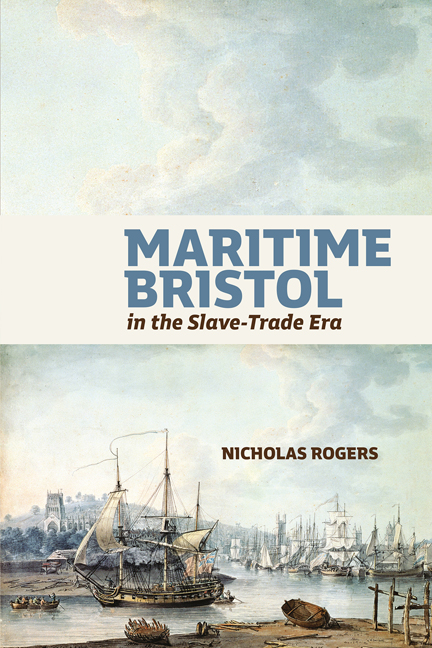Book contents
- Frontmatter
- Dedication
- Contents
- List of Figures
- Acknowledgments
- List of Abbreviations
- Introduction: High Tides, Atlantic Waters
- 1 The Pilots of Pill
- 2 The Hazards of the Bristol Slave Trade
- 3 Slave-ship Sociology
- 4 The Unfortunate Shipwright, or, the Trials of Robert Barker
- 5 Mutiny and Murder on Bristol’s Long-haul Ships, 1720–70
- 6 Bristol Privateering in the Mid-eighteenth Century
- 7 The Impressment of James Caton, 1779
- 8 New York in Bristol: the Crugers
- 9 The Politics of Abolition in Late Eighteenth-century Bristol
- Bibliography
- Index
7 - The Impressment of James Caton, 1779
Published online by Cambridge University Press: 08 May 2024
- Frontmatter
- Dedication
- Contents
- List of Figures
- Acknowledgments
- List of Abbreviations
- Introduction: High Tides, Atlantic Waters
- 1 The Pilots of Pill
- 2 The Hazards of the Bristol Slave Trade
- 3 Slave-ship Sociology
- 4 The Unfortunate Shipwright, or, the Trials of Robert Barker
- 5 Mutiny and Murder on Bristol’s Long-haul Ships, 1720–70
- 6 Bristol Privateering in the Mid-eighteenth Century
- 7 The Impressment of James Caton, 1779
- 8 New York in Bristol: the Crugers
- 9 The Politics of Abolition in Late Eighteenth-century Bristol
- Bibliography
- Index
Summary
On the 12 July 1779, the merchant James Caton was arrested at the Bristol Exchange by Lieutenant Richard Lane of the press gang. Merchants protested at his abrupt detention, especially his friend, Paul Farr, who was told to back off, otherwise Lane ‘would shoot him with his pistol’. Caton was whisked away to a lock-up in Prince Street, a ‘nasty stinking room’ in which the chimney place was used as a common latrine. Lane derisively offered Caton a shilling for victuals, ordered the sentry to bolt the door, and refused to allow any of his friends to consult with him. When the regulating officer, Captain William Hamilton arrived, Caton demanded to know the reason for his arrest and again insisted he meet with his friends to settle his affairs. Hamilton retorted that he was ‘fit to serve the king’ and would not see any of his friends or associates until he was aboard the tender at Kingroad. He also refused Caton's request to see the mayor of the city, Sir John Durbin, remarking that ‘he has no business with it’. The two lieutenants of the rendezvous, Richard Lane and William Springhorpe, were equally uncooperative, and at 6p.m. Caton was hustled onto an open boat at the Gibb and taken seven miles down the river Avon to Kingroad. There Paul Farr was denied access to his friend, but he tried again the following morning along with Thomas Mullett and a man called Davis. Despite promises that they might finally talk with Caton, they were ‘peremptorily refused admittance’. The words suggest they were never allowed on board the tender.
The Caton affair engaged ‘the conversation of all ranks of people’ in Bristol and inevitably prompted some pressing questions. Why was a merchant like James Caton arrested at the Exchange? Why was he denied an audience with the mayor and his friends? The answer to the first question was that Hamilton believed there were plausible grounds for impressing Caton because he was someone who had been in the merchant marine. He was a former captain who had commanded Bristol ships for leading Bristol merchants, very possibly in the Mediterranean trade in the mid-1750s, but also in the American trades.
- Type
- Chapter
- Information
- Maritime Bristol in the Slave-Trade Era , pp. 156 - 173Publisher: Boydell & BrewerPrint publication year: 2024

